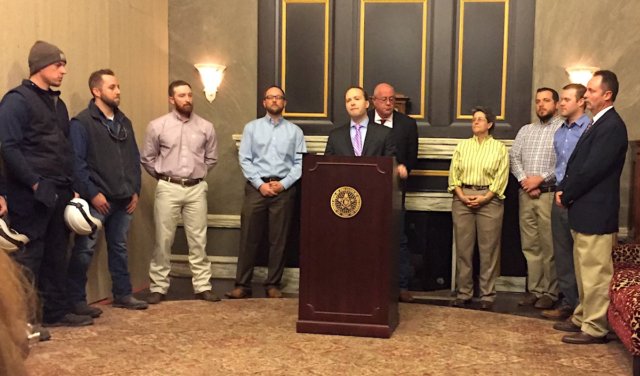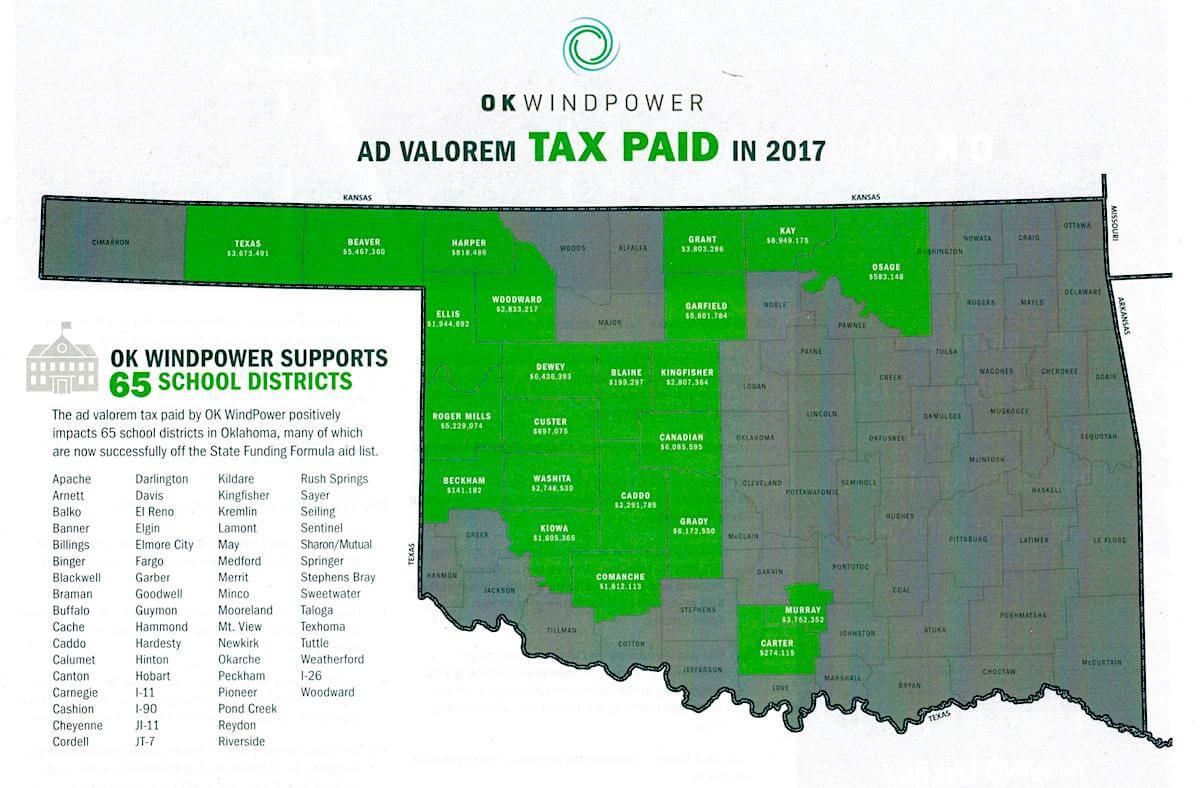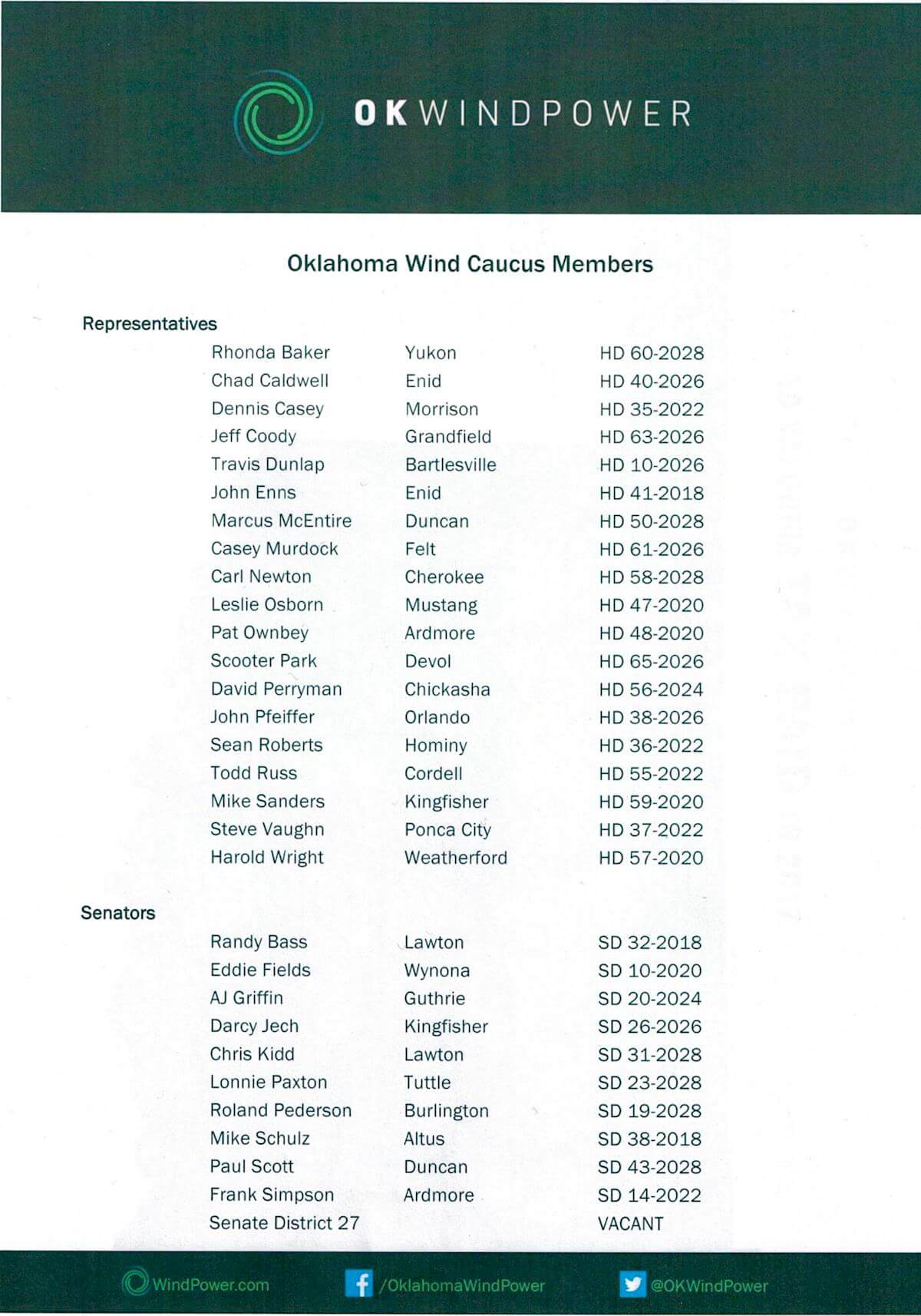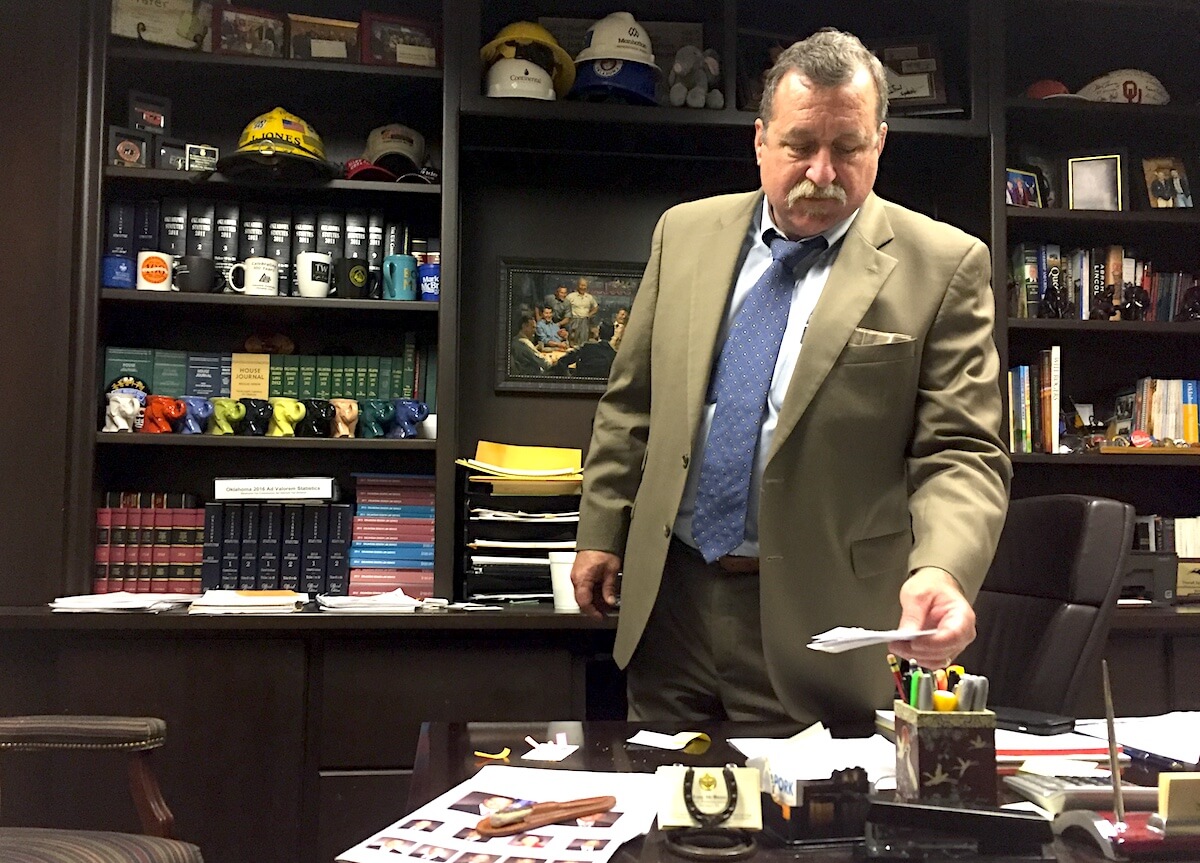

As Mark Yates of OK Wind Power was wrapping up his press conference this morning in the Oklahoma House of Representatives lounge, a Sergeant at Arms walked into the crowded room.
“The speaker’s office is directing me to stop the meeting,” the sergeant said in his trademark green jacket. “This was not reserved for you guys today, so we need to stop.”
An unidentified man in the audience replied.
“It was reserved through Rep. Inman’s office,” the man said, referring to the former House minority leader who announced his resignation in October only to reverse course in December.
“The speaker has asked me to come in and stop it right now. You need to move to another location,” the sergeant said.
Roughly one hour later, the press secretary for House Speaker Charles McCall (R-Atoka) released a statement countering the sergeant.
“The Speaker’s Office did not ask the House sergeants to remove anyone from the House Lounge. The issue was brought up by a member of the House, and a House administrator asked the House sergeants to enforce the House policy,” said Jason Sutton. “The long-standing policy of the House of Representatives regarding use of the House lounge is that only lawmakers may reserve the room and must be present during the use. The House lounge was reserved through Rep. Steve Kouplen’s office for Tuesday, Feb. 6, from 10 a.m. to 11 a.m. for a ‘Democrat Caucus.'”
Sutton attached the room reservation list to his email.
“The room was clearly being used instead for a news conference by individuals from a private industry, and no Democratic House members were present as sponsors,” Sutton continued. “Individuals, businesses or associations from outside the Capitol may not use the House lounge absent a sponsoring lawmaker. It is unclear who, if anyone, authorized a third-party group to use the House lounge.”
‘Who do they think they are?’
The House member who brought the unusual nature of Tuesday’s press conference to staff attention was Rep. Mark McBride (R-Moore), a critic of the wind industry who has suggested they may be responsible for the tracking device found on his truck and who intends to carry bills this session to raise taxes on the industry.
“When I saw them taking advantage of the House lounge when we have a broadcast press room, it made my blood boil,” said McBride who removed OK Wind Power signs that were taped to the House lounge doors during the press conference. “Who do they think they are? That room belongs to the House of Representatives. You don’t put signs on the door for your press conference.”
McBride’s frustration with the wind industry — and the industry’s frustration with McBride — highlight the rising tension between Oklahoma lawmakers and billion-dollar business interests. The tension has even pitted industries against each other, with the wind industry being criticized by some of the state’s most powerful oil and gas leaders. Meanwhile, the viability of the Step Up Oklahoma plan hinges heavily on what new taxes may be proposed on wind production and whether that proposal is a deal breaker for House members, particularly Democrats.
“I think the political volatility that has been created in the back and forth has really created a climate that is not healthy for Oklahoma,” Yates said in his press conference Tuesday. “And I’m cautiously optimistic that we can turn the tide and that this can be the session some of this is put to bed and we can move forward as a state and look at how we can take all of our energy sources, promote them and embrace them.”
Flanked by people connected to the wind industry, Yates said wind companies have benefited from past state investment incentives but have still paid substantial ad valorem taxes to boost schools, hospitals and other public entities. In 2017, Yates said 23 counties received a total of $74 million in ad valorem dollars.

“We have put the largest valuations we’ve ever seen in these rural areas,” said L. Wade Patterson, the longtime Garfield County assessor who quit his job recently to become a consultant.

OK Wind Power representatives handed out documents Tuesday mapping statewide wind assets, noting that the state is now America’s second-leading wind energy producer and listing “members” of an Oklahoma Wind Caucus.
Multiple House members on the list told NonDoc they had not heard of a “Wind Caucus,” and many speculated that it was simply a list of lawmakers who have wind investments in their districts. Senate District 27 is listed as a member, despite it currently being vacant.
‘Anti-wind rhetoric’

For his sake, McBride is an unabashed critic of wind and a proud supporter of oil and gas. He speaks openly about how his campaign contributions reflect oil and gas support much like other members’ accounts show wind donations.
McBride’s office is adorned with hard hats that feature the names of energy companies, and a framed print of Continental Resources CEO Harold Hamm’s Forbes Magazine cover hangs on McBride’s wall. He voted against the November revenue plan, arguing that its hike in gross production taxes would hurt the oil and gas industry. Now, he is supportive of the Step Up Oklahoma plan that is demonstrably similar but includes the rumored new taxes on wind generation.
“Somehow they’ve got to pay tax,” McBride said of the wind industry. “Some kind of use or sales tax or something. They can sing whatever song they want to sing, but the state is paying (most of the ad valorem taxes).”
Yates called that type of characterization “anti-wind rhetoric.”
“There’s been some that have grabbed on to the anti-wind rhetoric and believe that’s the scapegoat for the state’s problems and the state’s ills,” Yates said. “I think we would all agree there’s an abundance of issues and things we need to address.”
House Majority Leader Jon Echols (R-OKC) has an abundance of issues on his plate, and without knowing the language in McBride’s planned wind proposals, he called for “equity” in how industries are handled.
“Whatever we do needs to be equitable. It needs to be equitable to all industries. It needs to be equitable to all Oklahomans,” said Echols, an attorney who noted that “equitable” and “equal” have different meanings. “We need some form of equity in whatever we’re doing, and that’s why these decisions are so hard. The business models are so different.”
Yates went into complex detail at his press conference about how oil and gas is taxed differently than wind already, thus making any new “production” tax on wind inequitable in the eyes of industry investors.
“It’s not apples to oranges, it’s apples to bread. Our relative tax burden is already much higher than 7 percent oil and gas gross production tax,” Yates said. “We have brought viable options to the table that have been rejected.”
Yates said the proposals of McBride, Step Up Oklahoma leaders and others are “punitive” to the wind industry, but Echols said that is not the intention of the Legislature.
“I have no idea what the minds of the Step Up people are, but there’s nothing punitive with the Legislature,” he said. “I love wind.”
Yates said that’s not the message some have heard.
“I think it’s very easy to take on anti-wind rhetoric and some of the propaganda that has been floated around this building for the last three years,” Yates said. “I think most see through that propaganda.”




















